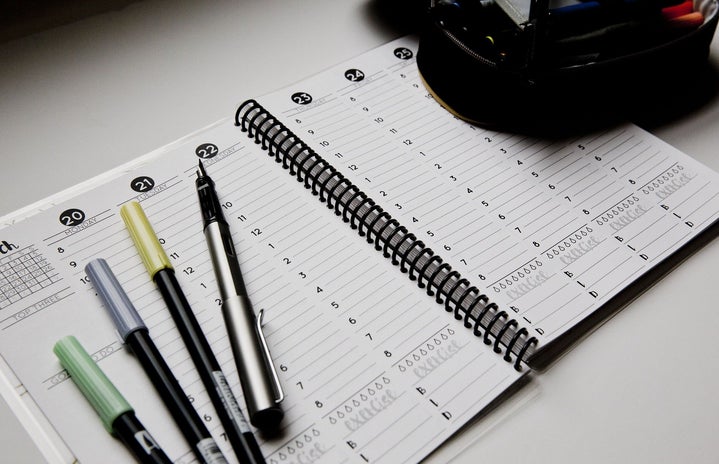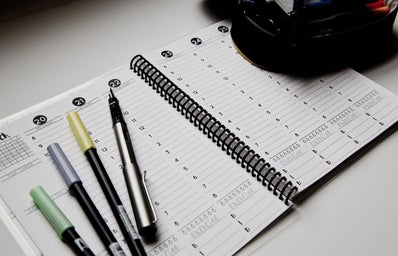1. “But how does that make you feel?” Expressive writing can relieve stress and help you ace your finals. A study by researchers from the University of Chicago found that anxious students who wrote about what they were thinking and feeling for 10 minutes performed significantly better on math tests than those who did not. If you’re the type to wig out right before a big test, try putting pen to paper instead.
2. Study in your sleep. Sound too good to be true? It’s actually not, and there’s science to prove it. In a study published by the Public Library of Science, subjects who slept immediately after learning information retained it better than those who stayed awake. While it might be tempting to pull an all-nighter to cram for your 8am exam, sleep can actually help you study. Review your material right before you go to bed, and let your brain do the rest.
3. Mix it up. Switching up where you study and what you’re studying can help your brain learn better. Don’t get too attached to that one cubicle on the second floor of Ladd; In a 1978 issue of Memory and Cognition, psychologists reported that college students who had studied a set of vocabulary words in two different rooms remembered more than those who had studied the same vocabulary list twice in the same room. When you study, your brain associates the material with your surroundings, which can help trigger recall at a later time. The more places you study the same material, the more associations your brain has to it, and the easier it is for your brain to remember during your exam what year the Spanish Inquisition was established. (This is also the reason why chewing the same flavor of gum while you study and while you take the exam can also help with memory recall.)
It also helps to rotate the study material, a technique called interleaving, rather doing the same thing over and over again. In a study published in journal Applied Cognitive Psychology, Kelli Taylor and Doug Rohrer found that children who used interleaving to study mathematics problems significantly improved their test performances over those who didn’t. The key is that interleaving keeps your brain on its toes; it can’t anticipate what process it will have to use, so it has to stop and actually think about what is the best approach – exactly the type of thing you will want to be able to do on your exams. So when you study for your politics exam, try switching it up between reading case law, memorizing vocabulary and reviewing political theories. You’ll be glad you did on exam day.
4. Food for thought. There is nothing worse than studying hungry. Power through your exams with the right fuel for your body, which can be found in Commons.
Apples: Studies show that quercitin, an antioxidant found in apple peels, can enhane memory. Hummus: Chickpeas, the main ingredient in hummus, have two things that are very important to brain performance: folic acid, which has been linked to supporting memory, and protein, which provides the amino acids to build your brain’s neurotransmitters. Plus, hummus taste awesome with carrots, which contain luteolin, a compound that reduces age-related memory loss so it’s pretty much a win-win. Be smart now, stay smart later, eat tasty food – the trifecta.
Coffee and chocolate: Coffee and chocolate are sources of caffeine, which, in small quantities, can increase alertness for study sessions. One hundred to two hundred fifty milligrams is enough – about a cup of coffee – even though doctors say you can have up to four hundred milligrams a day. After that, the positive effects start to wear off; too much caffeine causes jitteriness and insomnia, which is the last thing you want the night before an exam. Caffeine stays in your system for an extremely long time (up to 14 hours), so when you’re about to grab that third cup of the day at 3PM, you may want to think twice.
Green tea: A study published in Molecular Nutrition and Food Research linked green tea to the increased production of brain cells, which benefits spatial learning and memory.
5. The Sound of No Music. Most Batesies listen to music while they’re working, so this will be a hard one. Even though it makes reviewing that economics problem set more enjoyable, listening to music with vocals can be detrimental to your exam score. A study by University of Wales found that students who worked without music did better on recalling a specific order of things than students who listened to music with vocals, whether it was music they liked or disliked. Vocals are a particularly bad idea when studying foreign languages, for obvious reasons. If you can’t live without music, your best bet is to stick to classical; Stanford researchers discovered that obscure symphonies stimulated the part of the brain that makes you pay attention.
And, if you want a good study break, British scientists and the band Marconi Union believe they have scientificially engineered the relaxing song ever.
Happy science-backed studying!

